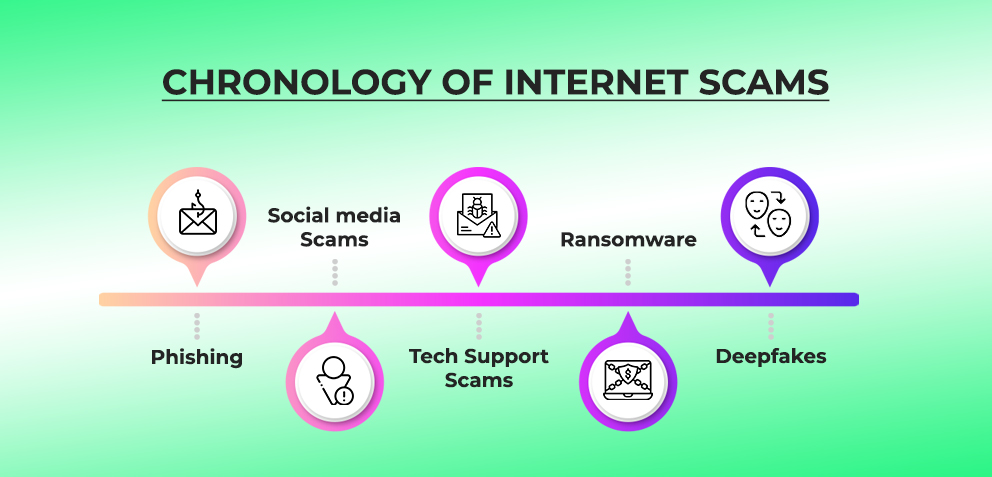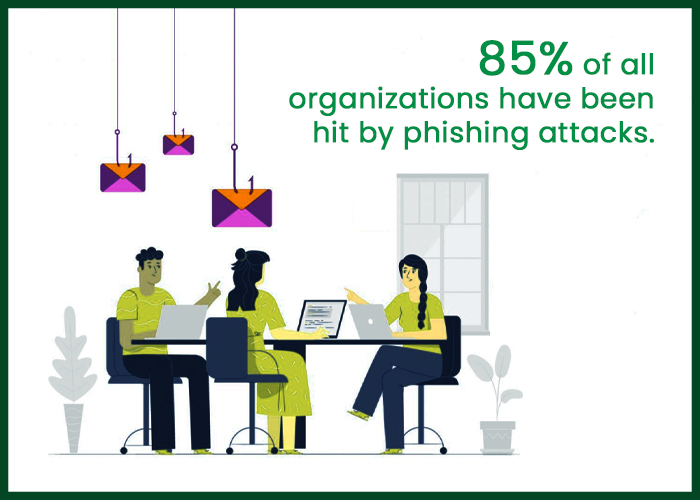The Evolution of Internet Scams: From Phishing to Deepfakes


Remember when the most exciting item in your phone inbox was a forwarded chain email promising you good luck if you shared it with ten friends? Aah, Good’ol days t’was! Fast forward to today, when the internet is like an organized crime world, with scammers continuously devising new ways to steal your hard-earned money.
From phishing to deepfakes, this tutorial takes a stroll through the progression of internet scams and understands these sorts of scams running all over the internet.
Internet scams are increasing nowadays, leading to emerging threats and malicious attacks. So, let’s unmask the chronology of the internet scams. Let’s begin!
Phishing scams are like the bothersome little siblings of the scam family; they’ve been around for eternity. This involves scammers sending emails that appear to be from reputable firms in order to deceive you into disclosing personal information such as passwords or credit card details.

With the growing popularity and increasing number of social media platforms, the number of frauds associated with them has also increased. As per the Federal Trade Commission (FTC), social media scams cost more than $117 million in the first six months of 2020 alone. Scammers now send direct messages with the same frequency as your creepy high school crush. Social media frauds, such as phoney freebies, cloned accounts, and too-good-to-be-true investment possibilities, are the modern hustle.
What’s the latest trick? Scammers sneak into a friend’s account and pretend to be them or I have seen few interesting cases where these scammers pretend to be a celebrity requesting money because they are “stuck in Paris.” Spoiler alert: Your favourite celeb is probably chillin somewhere with their friends and probably never even heard of you.
Tech assistance scams target the less tech-savvy among us. This kind of scam was once very popular in countries like the United States and Australia. And you receive a call or a popup stating that your computer has been infected and that for a modest cost (and remote access), a pleasant “technician” would fix it. Spoiler: They will not. Instead, they will steal your information or install malware. Recently, I came across a real badass Jason Statham movie based on a similar subject: The Beekeper. You folks might wanna check it out.

This is the digital equivalent of being held at gunpoint. Their malicious software would lock you out of your system & only option for you would be to pay them a ransom, which, thanks to modern technologies, will be an untraceable cryptocurrency.
What is the best defense? Glad you asked! Make regular backups of your data, and never click on links that look fishy.
Deepfakes are the new mafia in this world of crime; they are both cool and dangerous. Scammers use advanced artificial intelligence to make hyper-realistic movies or audio recordings of people (typically public figures) saying or doing things they never did. Trust me when I tell you this that you have seen a lot of deepfakes around you; in fact, you do everyday. Sometimes, it’s a fake Instagram profile of a celebrity; sometimes, it’s your favorite celeb doting an explicit outfit. But the most dangerous kind is when scammers use it to influence people’s political opinions.

So, how can you avoid these digital bullets? Here are some tips:
In this ever-changing field of internet scams, staying one step ahead of the scammers is a full-time job. However, with a little skepticism and caution, you can safely explore the wilds of the internet. To protect yourself, use our all-in-one antivirus software- AVP Suite.
AVP Suite is a robust antivirus security against phishing attacks through an extensive array of features. We exercise advanced email scanning to identify and block malicious emails, real-time URL filtering to prevent access to dishonest websites, and meticulous analysis combined with behavioral monitoring to recognize any suspicious activity.
Additionally, AVP Suite includes browser protection with an anti-phishing toolbar, ensuring safe browsing experiences and regular updates to stay ahead of emerging threats, empowering your safety. This multi-layered approach ensures that all your devices are guarded against phishing, ransomware, deepfake, and social media scam attempts, keeping your personal information exclusively yours. Try AVP Suite Now!